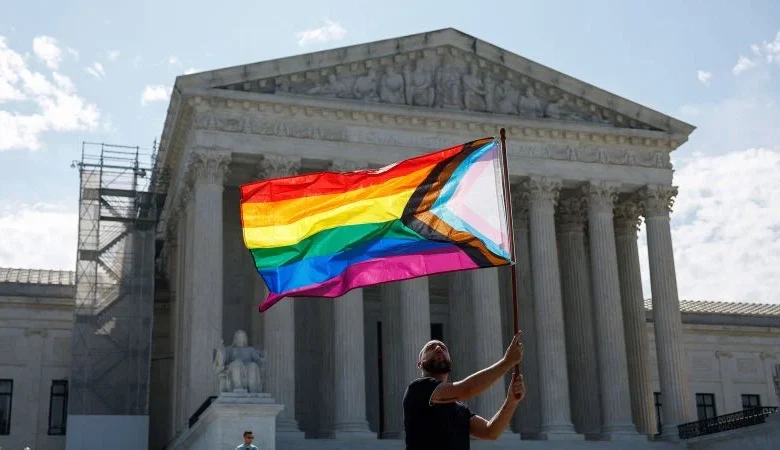Supreme Court declines to revisit landmark same-sex marriage precedent

The Supreme Court on Monday declined an opportunity to overturn its landmark precedent recognizing a constitutional right to same-sex marriage, tossing aside an appeal that had roiled LGBTQ advocates who feared the conservative court might be ready to revisit the decade-old decision.
Instead, the court denied an appeal from Kim Davis, the former Kentucky county clerk who now faces hundreds of thousands of dollars in damages and legal fees for refusing to issue marriage licenses after the court’s decision in Obergefell v. Hodges allowed same-sex couples to marry.
The court did not explain its reasoning to deny the appeal, which had received outsized attention – in part because the court’s 6-3 conservative majority three years ago overturned Roe v. Wade and the constitutional right to abortion that 1973 decision established. Since then, fears about Obergefell being the precedent to fall have grown.
The Supreme Court today is far different and far more conservative than the one that decided Obergefell in 2015, which is part of what had given LGBTQ advocates pause about the Davis appeal.
Justice Anthony Kennedy, the key swing vote who authored the Obergefell decision, retired in 2018 and was replaced by conservative Justice Brett Kavanaugh. Justice Ruth Bader Ginsburg, a liberal icon who was also in the Obergefell majority, died in 2020 and was succeeded by Justice Amy Coney Barrett, a conservative.
Three current justices – Chief Justice John Roberts and Justices Clarence Thomas and Samuel Alito – were in dissent in Obergefell.
Kennedy’s opinion spoke eloquently of the most fundamental values of family, love and liberty.
“No union is more profound than marriage, for it embodies the highest ideals of love, fidelity, devotion, sacrifice and family,” Kennedy wrote. “In forming a marital union, two people become something greater than they once were.”
The Obergefell decision prompted a massive celebration that began outside the Supreme Court on the day it was decided in late June of 2015. That evening, the White House was lit in rainbow colors. Many same-sex couples rushed into courthouses to wed. Nearly 600,000 same-sex couples have since married, according to the Williams Institute at the UCLA School of Law.
But some conservatives viewed the outcome as a betrayal and predicted future conflicts with religion. Davis, who at the time was the clerk of Rowan County in Kentucky, cited her religious objection to same-sex marriage as justifying her decision to withhold marriage licenses to all couples. She was sued by multiple couples in the county, and a jury ordered her to pay $360,000 in damages and legal fees.
After a federal court found she had violated a court order to issue licenses, Davis was also thrown in jail for several days.
Writing in dissent, the late Justice Antonin Scalia blasted the court’s decision as a “threat to American democracy.”
“The substance of today’s decree is not of immense personal importance to me,” he wrote. “But what really astounds is the hubris reflected in today’s judicial Putsch.”
Davis had argued that it was time “for a course correction” on Obergefell.
While virtually all of the focus on Davis’ appeal was aimed at her request to overturn Obergefell, the bulk of case actually dealt with a series of more technical questions. In appealing the damages verdict against her, the former clerk argued that the First Amendment’s religious protections should shield her from legal liability, particularly since she is no longer a public official. The 6th US Circuit Court of Appeals rejected that argument.
Several conservatives justices had signaled in recent weeks that there was no great appetite to reopen Obergefell. Barrett told the New York Times last month there are “very concrete reliance interests” at stake when it comes to same-sex marriage. Alito, while criticizing the precedent broadly during an address in Washington earlier this fall, stressed that it was a “precedent of the court that is entitled to the respect afforded by the doctrine of stare decisis.”
At the same time, there have been worrying signs for LGBTQ rights groups – particularly when it comes to cases involving transgender Americans. In recent months, the high court handed down a major decision allowing states to ban the use of puberty blockers and hormone therapy for trans youth, allowed the Trump administration to bar transgender Americans from serving in the military and allowed the administration to require US passports to include sex markers consistent with a person’s sex at birth.
The Supreme Court’s decision to decline to hear the Davis appeal sets no precedent. If another appeal arrives threatening to undermine or overturn Obergefell, the court will review that appeal from scratch.
This story was updated with additional details about the case.





